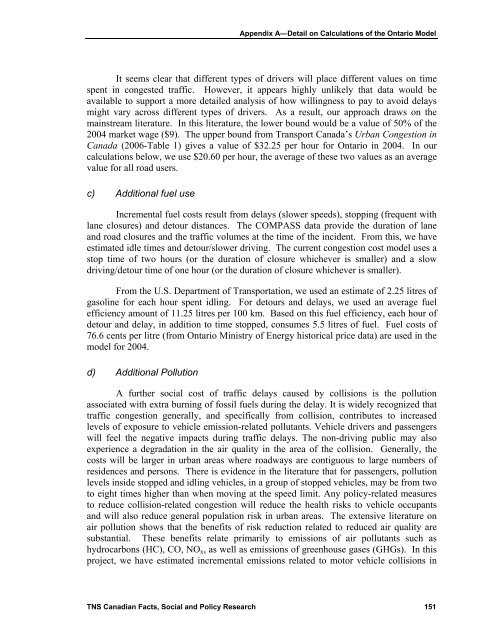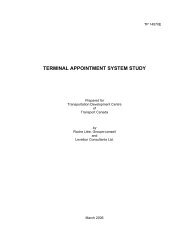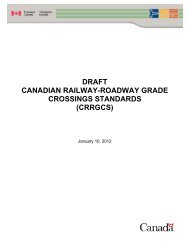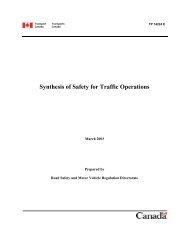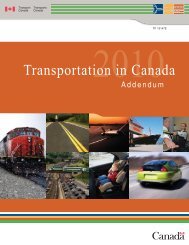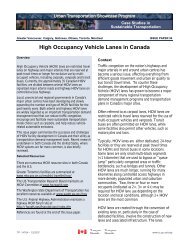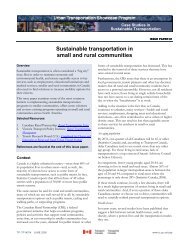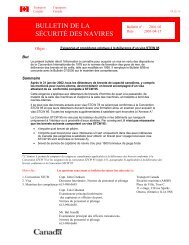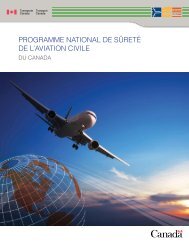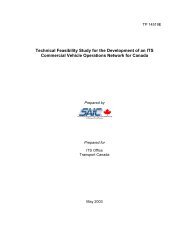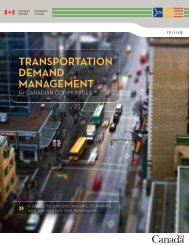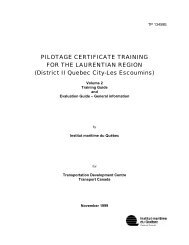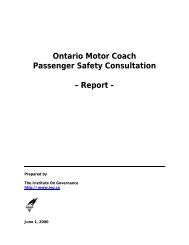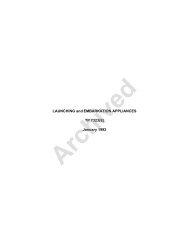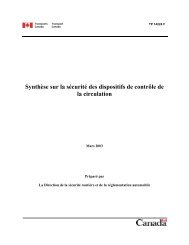Keith Vodden Dr. Douglas Smith - Transports Canada
Keith Vodden Dr. Douglas Smith - Transports Canada
Keith Vodden Dr. Douglas Smith - Transports Canada
You also want an ePaper? Increase the reach of your titles
YUMPU automatically turns print PDFs into web optimized ePapers that Google loves.
Appendix A—Detail on Calculations of the Ontario Model<br />
It seems clear that different types of drivers will place different values on time<br />
spent in congested traffic. However, it appears highly unlikely that data would be<br />
available to support a more detailed analysis of how willingness to pay to avoid delays<br />
might vary across different types of drivers. As a result, our approach draws on the<br />
mainstream literature. In this literature, the lower bound would be a value of 50% of the<br />
2004 market wage ($9). The upper bound from Transport <strong>Canada</strong>’s Urban Congestion in<br />
<strong>Canada</strong> (2006-Table 1) gives a value of $32.25 per hour for Ontario in 2004. In our<br />
calculations below, we use $20.60 per hour, the average of these two values as an average<br />
value for all road users.<br />
c) Additional fuel use<br />
Incremental fuel costs result from delays (slower speeds), stopping (frequent with<br />
lane closures) and detour distances. The COMPASS data provide the duration of lane<br />
and road closures and the traffic volumes at the time of the incident. From this, we have<br />
estimated idle times and detour/slower driving. The current congestion cost model uses a<br />
stop time of two hours (or the duration of closure whichever is smaller) and a slow<br />
driving/detour time of one hour (or the duration of closure whichever is smaller).<br />
From the U.S. Department of Transportation, we used an estimate of 2.25 litres of<br />
gasoline for each hour spent idling. For detours and delays, we used an average fuel<br />
efficiency amount of 11.25 litres per 100 km. Based on this fuel efficiency, each hour of<br />
detour and delay, in addition to time stopped, consumes 5.5 litres of fuel. Fuel costs of<br />
76.6 cents per litre (from Ontario Ministry of Energy historical price data) are used in the<br />
model for 2004.<br />
d) Additional Pollution<br />
A further social cost of traffic delays caused by collisions is the pollution<br />
associated with extra burning of fossil fuels during the delay. It is widely recognized that<br />
traffic congestion generally, and specifically from collision, contributes to increased<br />
levels of exposure to vehicle emission-related pollutants. Vehicle drivers and passengers<br />
will feel the negative impacts during traffic delays. The non-driving public may also<br />
experience a degradation in the air quality in the area of the collision. Generally, the<br />
costs will be larger in urban areas where roadways are contiguous to large numbers of<br />
residences and persons. There is evidence in the literature that for passengers, pollution<br />
levels inside stopped and idling vehicles, in a group of stopped vehicles, may be from two<br />
to eight times higher than when moving at the speed limit. Any policy-related measures<br />
to reduce collision-related congestion will reduce the health risks to vehicle occupants<br />
and will also reduce general population risk in urban areas. The extensive literature on<br />
air pollution shows that the benefits of risk reduction related to reduced air quality are<br />
substantial. These benefits relate primarily to emissions of air pollutants such as<br />
hydrocarbons (HC), CO, NO x , as well as emissions of greenhouse gases (GHGs). In this<br />
project, we have estimated incremental emissions related to motor vehicle collisions in<br />
TNS Canadian Facts, Social and Policy Research 151


